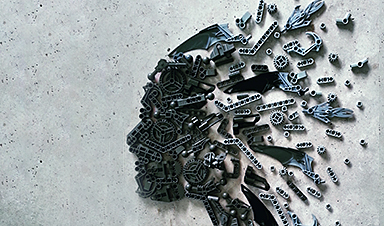Researchers from King’s College London have shown that when brain cells are directly exposed to blood taken from COVID-19 patients with delirium, there is an increase in cell death and a decrease in the generation of new brain cells. Delirium represents a state of confusion indicating that, in these patients, the COVID-19 infection had impacted the brain.
Published in Molecular Psychiatry, the study’s findings indicate a key role for the inflammatory proteins (cytokines) produced by the immune system during infection, and could help inform potential treatments to reduce symptoms of confusion, disorientation and memory deficits in COVID-19 patients.
Dr. Alessandra Borsini, NIHR Maudsley BRC Senior Research Fellow, Institute of Psychiatry, Psychology & Neuroscience, first author, said, “More and more, research is indicating that there is a neurological element to severe COVID-19 infection, but we have little understanding about what happens in the brain to produce these symptoms. Our research is the first to use blood samples from COVID-19 patients experiencing delirium to investigate how the infection impacts a process called ‘neurogenesis’ (the generation of new brain cells), which is essential to maintain intact brain functions, including memory and thought processes.
“We have found that there is a profound reduction in the generation of new brain cells and an increase in cell death, and these are likely mechanisms behind delirium, and possibly other neurological symptoms, in COVID-19 patients.”
Previous research indicates that 20 to 30% of COVID-19 patients will develop neurological symptoms such as delirium, with rates of 60 to 70% in cases of severe illness. Delirium is a state of mental confusion that can happen if you become medically unwell and is associated with adverse outcomes, including prolonged hospitalization and death.
The development of neurological symptoms in COVID-19 patients is likely to involve an overactive immune response, called the cytokine storm, with an excessive production of these multiple inflammatory proteins. Once produced by the immune cells in the body in response to the infection, these cytokines can then move from the blood to the brain and directly affect brain mechanisms. However, which cytokines are directly relevant to the development of neurological symptoms is currently unknown.
The study collected serum samples from 36 patients admitted to Guy’s and St Thomas’ NHS Foundation Trust, in London, during the first wave of the COVID-19 pandemic in the UK (March-June 2020). Half of these patients were experiencing delirium symptoms whilst the other half did not present with these symptoms at time of hospital admission.
Researchers used a validated in vitro human cell model that consists of cells from the hippocampus, a part of the brain fundamental in many cognitive, memory and learning skills. Researchers treated cells from the hippocampus directly with the serum samples and observed the impacts on cell generation and death, as well as on the levels of different cytokines.
Results showed that treatment with serum taken from COVID-19 patients with delirium increased cell death and decreased generation of new brain cells. Investigation of the serum showed that those patients with delirium had higher levels of the cytokine IL6, while there was no difference between patients on other cytokines. Treating the brain cells with the serum did produce higher levels of two other cytokines—IL12 and IL13 –suggesting there is a process or cascade where IL12 and I1L3 are generated by brain cells in response to inflammation in the body created by IL6, and together they produce the delirium.
Author Professor Carmine Pariante, Professor of Biological Psychiatry at the Institute of Psychiatry Psychology & Neuroscience (IoPPN), and Consultant Perinatal Psychiatrist at South London and Maudsley NHS Foundation Trust, said, “The role of inflammation and our immune response in COVID-19 infection is well-known, but research like ours is now revealing how it affects our brain, our thinking and our mental health.
“Through a series of tests, we have shown that it is likely that the initial production of cytokine proteins as part of the inflammatory response in COVID-19 infection triggers a cascade of other cytokines which reduce generation of new brain cells and increase cell death, leading to brain symptoms such as delirium. These neurological symptoms are very concerning for patients and their families, and the hope is that our research can help identify which treatments would be most appropriate to lessen or prevent these symptoms.”
News
Deadly Pancreatic Cancer Found To “Wire Itself” Into the Body’s Nerves
A newly discovered link between pancreatic cancer and neural signaling reveals a promising drug target that slows tumor growth by blocking glutamate uptake. Pancreatic cancer is among the most deadly cancers, and scientists are [...]
This Simple Brain Exercise May Protect Against Dementia for 20 Years
A long-running study following thousands of older adults suggests that a relatively brief period of targeted brain training may have effects that last decades. Starting in the late 1990s, close to 3,000 older adults [...]
Scientists Crack a 50-Year Tissue Mystery With Major Cancer Implications
Researchers have resolved a 50-year-old scientific mystery by identifying the molecular mechanism that allows tissues to regenerate after severe damage. The discovery could help guide future treatments aimed at reducing the risk of cancer [...]
This New Blood Test Can Detect Cancer Before Tumors Appear
A new CRISPR-powered light sensor can detect the faintest whispers of cancer in a single drop of blood. Scientists have created an advanced light-based sensor capable of identifying extremely small amounts of cancer biomarkers [...]
Blindness Breakthrough? This Snail Regrows Eyes in 30 Days
A snail that regrows its eyes may hold the genetic clues to restoring human sight. Human eyes are intricate organs that cannot regrow once damaged. Surprisingly, they share key structural features with the eyes [...]
This Is Why the Same Virus Hits People So Differently
Scientists have mapped how genetics and life experiences leave lasting epigenetic marks on immune cells. The discovery helps explain why people respond so differently to the same infections and could lead to more personalized [...]
Rejuvenating neurons restores learning and memory in mice
EPFL scientists report that briefly switching on three “reprogramming” genes in a small set of memory-trace neurons restored memory in aged mice and in mouse models of Alzheimer’s disease to level of healthy young [...]
New book from Nanoappsmedical Inc. – Global Health Care Equivalency
A new book by Frank Boehm, NanoappsMedical Inc. Founder. This groundbreaking volume explores the vision of a Global Health Care Equivalency (GHCE) system powered by artificial intelligence and quantum computing technologies, operating on secure [...]
New Molecule Blocks Deadliest Brain Cancer at Its Genetic Root
Researchers have identified a molecule that disrupts a critical gene in glioblastoma. Scientists at the UVA Comprehensive Cancer Center say they have found a small molecule that can shut down a gene tied to glioblastoma, a [...]
Scientists Finally Solve a 30-Year-Old Cancer Mystery Hidden in Rye Pollen
Nearly 30 years after rye pollen molecules were shown to slow tumor growth in animals, scientists have finally determined their exact three-dimensional structures. Nearly 30 years ago, researchers noticed something surprising in rye pollen: [...]
NanoMedical Brain/Cloud Interface – Explorations and Implications. A new book from Frank Boehm
New book from Frank Boehm, NanoappsMedical Inc Founder: This book explores the future hypothetical possibility that the cerebral cortex of the human brain might be seamlessly, safely, and securely connected with the Cloud via [...]
How lipid nanoparticles carrying vaccines release their cargo
A study from FAU has shown that lipid nanoparticles restructure their membrane significantly after being absorbed into a cell and ending up in an acidic environment. Vaccines and other medicines are often packed in [...]
New book from NanoappsMedical Inc – Molecular Manufacturing: The Future of Nanomedicine
This book explores the revolutionary potential of atomically precise manufacturing technologies to transform global healthcare, as well as practically every other sector across society. This forward-thinking volume examines how envisaged Factory@Home systems might enable the cost-effective [...]
A Virus Designed in the Lab Could Help Defeat Antibiotic Resistance
Scientists can now design bacteria-killing viruses from DNA, opening a faster path to fighting superbugs. Bacteriophages have been used as treatments for bacterial infections for more than a century. Interest in these viruses is rising [...]
Sleep Deprivation Triggers a Strange Brain Cleanup
When you don’t sleep enough, your brain may clean itself at the exact moment you need it to think. Most people recognize the sensation. After a night of inadequate sleep, staying focused becomes harder [...]
Lab-grown corticospinal neurons offer new models for ALS and spinal injuries
Researchers have developed a way to grow a highly specialized subset of brain nerve cells that are involved in motor neuron disease and damaged in spinal injuries. Their study, published today in eLife as the final [...]





















